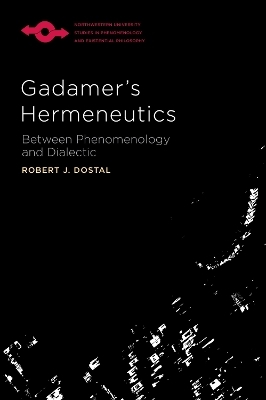
Gadamer's Hermeneutics
Between Phenomenology and Dialectic
Seiten
2023
Northwestern University Press (Verlag)
978-0-8101-4451-4 (ISBN)
Northwestern University Press (Verlag)
978-0-8101-4451-4 (ISBN)
Provides a comprehensive and critical account of Hans-Georg Gadamer's hermeneutical philosophy. Robert Dostal defends Gadamer against charges of linguistic idealism and emphasizes language's relationship to understanding, though he criticizes Gadamer for too often ignoring the role of the prelinguistic in our experience.
In Gadamer’s Hermeneutics Robert J. Dostal provides a comprehensive and critical account of Hans-Georg Gadamer’s hermeneutical philosophy, arguing that Gadamer’s enterprise is rooted in the thesis that “being that can be understood is language.” He defends Gadamer against charges of linguistic idealism and emphasizes language’s relationship to understanding, though he criticizes Gadamer for too often ignoring the role of the prelinguistic in our experience. Dostal goes on to explain the important role of the concept of “the inner word” for Gadamer’s account of language.
The book situates Gadamer’s hermeneutics in three important ways: in relation to the contestability of the legacy of the Enlightenment project; in relation to the work of his mentor, Martin Heidegger; and in relation to Gadamer’s reading of Plato and Aristotle. Dostal explores both Gadamer’s claim on the Enlightenment and his ambivalence toward it. He considers Gadamer’s dependence on Heidegger’s accomplishment while pointing out the ways in which Gadamer charted his own course, rejecting his teacher’s reading of Plato and his antihumanism. Dostal points out notable differences in the philosophers’ politics as well. Finally, Dostal mediates between Gadamer’s hermeneutics and what might be called philological hermeneutics. His analysis defends the civic humanism that is the culmination of the philosopher’s hermeneutics, a humanism defined by moral education, common sense, judgment, and taste. Supporters and critics of Gadamer’s philosophy will learn much from this major achievement.
In Gadamer’s Hermeneutics Robert J. Dostal provides a comprehensive and critical account of Hans-Georg Gadamer’s hermeneutical philosophy, arguing that Gadamer’s enterprise is rooted in the thesis that “being that can be understood is language.” He defends Gadamer against charges of linguistic idealism and emphasizes language’s relationship to understanding, though he criticizes Gadamer for too often ignoring the role of the prelinguistic in our experience. Dostal goes on to explain the important role of the concept of “the inner word” for Gadamer’s account of language.
The book situates Gadamer’s hermeneutics in three important ways: in relation to the contestability of the legacy of the Enlightenment project; in relation to the work of his mentor, Martin Heidegger; and in relation to Gadamer’s reading of Plato and Aristotle. Dostal explores both Gadamer’s claim on the Enlightenment and his ambivalence toward it. He considers Gadamer’s dependence on Heidegger’s accomplishment while pointing out the ways in which Gadamer charted his own course, rejecting his teacher’s reading of Plato and his antihumanism. Dostal points out notable differences in the philosophers’ politics as well. Finally, Dostal mediates between Gadamer’s hermeneutics and what might be called philological hermeneutics. His analysis defends the civic humanism that is the culmination of the philosopher’s hermeneutics, a humanism defined by moral education, common sense, judgment, and taste. Supporters and critics of Gadamer’s philosophy will learn much from this major achievement.
Robert J. Dostal is the Rufus M. Jones Professor of Philosophy at Bryn Mawr College. He is the editor of The Cambridge Companion to Gadamer.
Acknowledgements
Preface
1. Gadamers’s Ambivalence Toward the Enlightenment Project
2. Humanism and Politics: Gadamer’s Humanism in the Face of Heidegger’s Anti-humanism
3. Saving Plato from Platonism
4. From Bildung to Bild: Gadamer’s Aesthetics
5. Language and Understanding
6. Hermeneutics and Science
7. Between Phenomenology and Dialectic
8. Concluding Remarks: The Conversation that We Are—Solidarity
Notes
Bibliography
Index
| Erscheinungsdatum | 31.01.2022 |
|---|---|
| Reihe/Serie | Studies in Phenomenology and Existential Philosophy |
| Verlagsort | Evanston |
| Sprache | englisch |
| Maße | 152 x 229 mm |
| Themenwelt | Geisteswissenschaften ► Philosophie ► Geschichte der Philosophie |
| Geisteswissenschaften ► Philosophie ► Philosophie der Neuzeit | |
| ISBN-10 | 0-8101-4451-4 / 0810144514 |
| ISBN-13 | 978-0-8101-4451-4 / 9780810144514 |
| Zustand | Neuware |
| Haben Sie eine Frage zum Produkt? |
Mehr entdecken
aus dem Bereich
aus dem Bereich
die kolonialen Wurzeln der französischen Theorie
Buch | Hardcover (2024)
Matthes & Seitz Berlin (Verlag)
28,00 €
oder Das Leben Montaignes in einer Frage und zwanzig Antworten
Buch | Softcover (2023)
C.H.Beck (Verlag)
18,00 €


